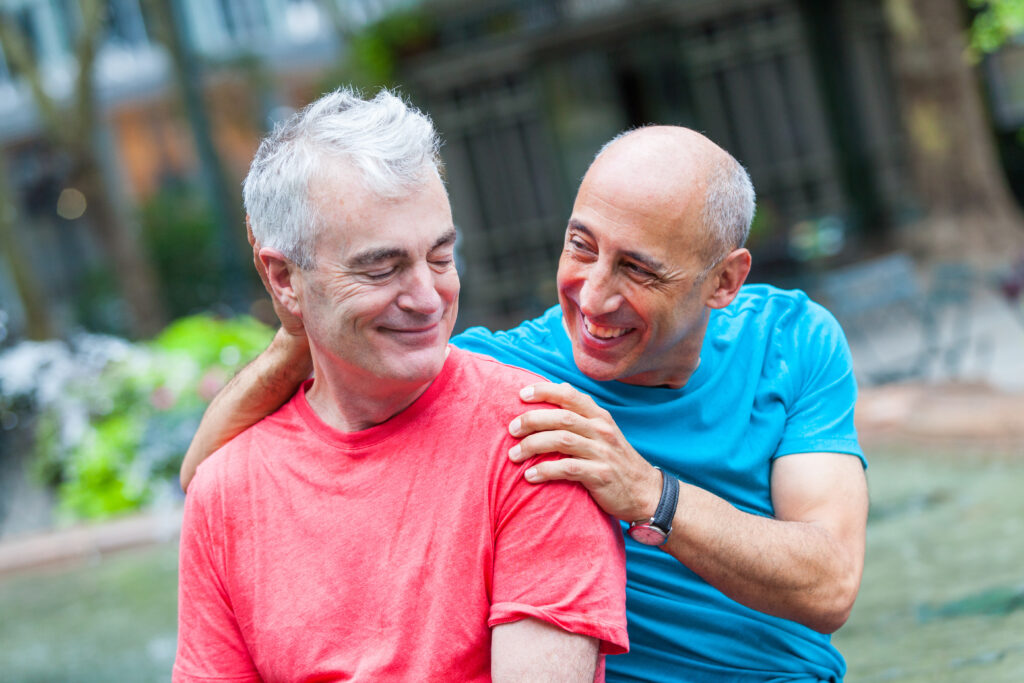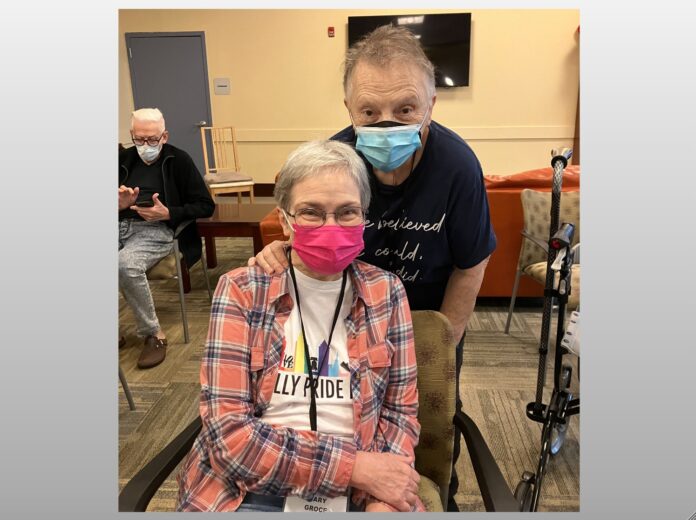Third in a three part series.
The first generation of Stonewall survivors is aging. Yet the LGBT+ community has remained youth-focused and as a community has not addressed its elders well. SAGE (Services & Advocacy for LGBT Elders), the nation’s largest organization serving LGBT elders, states “We’re still in the early stages of grasping what it really means to be LGBT and older. … Now, a confluence of a cultural and legal shift — along with sheer population size — is changing how we approach the needs of the LGBT senior community.”
The last of the Baby Boomer generation, those born in the post-World War II years between 1946 and 1964, will turn 65 in 2029, at which point a fifth of the U.S. population, including the LGBT+ community, will be elders. Many older LGBT+ Philadelphians feel the community hasn’t kept up with their needs. SAGE estimates there will be seven million LGBT+ elders by 2030.
SAGE provided PGN with some startling statistics on LGBT+ elders that should serve as a wake-up call for the needs of this crucial segment of the community, many of whom were frontline activists in fighting for LGBT+ civil rights.
According to SAGE, one-third of LGBT+ older adults live at or below 200% of the federal poverty level. LGBT+ elders are poorer and have fewer financial resources than their non-LGBT+ counterparts. In addition, trans people in the U.S. are more than twice as likely to live in poverty as non-trans people, and trans people of color are more than three times as likely to live in poverty. There are almost no data on trans elders.
In addition, because LGBT+ people are more likely to be subject to employment discrimination, their earnings and Social Security payments are lower. All of which means it is harder for LGBT+ elders to find affordable housing as they age.
Alva Diaz, 71, and Rita Jones, 75, are facing that reality now. The couple expected to live out what Jones calls their “crone years” together. But now their lives are in flux because Diaz’s health has been deteriorating and Jones isn’t sure they can manage on their own anymore without regular help.
“You see all these ads on TV about ‘aging in place’ or joining one of these glitzy communities in the suburbs,” Jones said. “But those places always look very white and very straight and we’re neither.”
Like many women over 70, financial stability is a pressing concern for the couple, who have fixed incomes. Discussions the women have had about their future have focused on trying to stay in their Germantown home. But with Diaz’s increasing incapacitation from heart disease and rheumatoid arthritis, “aging in place” may require that they find a younger caregiver to live in — something neither woman wants.
“You get used to a certain level of intimacy as a couple,” Diaz explains. “Having a third person here would be like always having company, always being ‘on.’ I don’t think that would be good for us — I think it would be stressful. Too stressful.”
Yet both women realize that it’s something they may have to consider because, as Jones said, “We refuse to be separated. We are going to live out our days together — we just have to figure out how.”
Safe, affordable housing remains a key focus for LGBT+ elders. According to an Equal Rights Center report on barriers to senior housing for same-sex couples, 48% of older same-sex couples applying for elder housing were subjected to discrimination. Dr. David Vincent, the Chief Program Officer at SAGE, where he provides vision, oversight and leadership to all direct service programs, told PGN that discrimination puts LGBT+ elders at greater risk for chronic health problems, social isolation, poverty and even premature mortality.

Vincent stressed the importance of helping LGBT+ elders with navigating housing and finances. He emphasized the importance of having accessible and affordable housing for LGBT+ elders “outside the Gayborhood, because that’s where most LGBT+ elders are living. We really need to address this factor of aging — that so many of our elders are financially unable to find affordable housing and that puts them at real risk of homelessness.”
As Vincent explained, the “barriers to wealth” that most LGBT+ elders face “are through no fault of theirs,” but rather a factor of a lifetime of discrimination and inability to accrue wealth due to discrimination in the workplace, lack of access to well-paying jobs, and the relentlessness of homophobia and transphobia at every level of society.
For Mary Groce, 73 and Suz Atlas, 79, the John C. Anderson Apartments (JCAA) in Center City has been a life-saver and a lifeline to community. The lesbian couple have faced numerous health crises in recent years, which made their apartment at JCAA all the more critical, with its easy access to local hospitals as they both dealt with cancer diagnoses.
Atlas says that she and Groce were eager to move into the complex and be among other “like-minded” people. “We really couldn’t get here fast enough,” she said. The couple have been living at JCAA since 2017.
JCAA opened in 2014 and is named for the late Black gay City Council member. A 56-unit, six-story complex with a garden, JCAA cost just under $20 million to build. On 13th St. at Spruce, it is in the heart of the Gayborhood, right near the William Way Community Center and just blocks from the Giovanni’s Room bookstore.
JCAA has been a model for low-income housing for LGBT+ elders in the U.S. and SAGE highlights it as part of their focus on their National LGBTQ+ Housing Initiative.
Groce, a writer, has been putting out a monthly newsletter from JCAA for years with contributions from a myriad of JCAA’s tenants. She noted that the “togetherness and community” of the complex has been a lifeline for many, particularly throughout the pandemic and that the newsletter was a means of connecting when everyone was hunkered down, trying not to get Covid.
“The newsletter is so helpful,” Groce said simply, noting that there are now 13 contributors. Atlas added, “And people actually read it!”
Talking about JCAA both women are exuberant. “It’s community. Friends. Community is the main thing — it’s a connection. We need that as we age,” Groce said.
Atlas noted, “We’re also set in our ways. We like being around like-minded people,” by which she means other LGBT+ elders, many of whom have the same activist histories as she and Groce have.
Both women asserted that the pandemic underlined how important these connections are. And connection — not being isolated or too solitary — is essential to healthy aging and something that LGBT+ seniors do not have sufficient access to, which Vincent cites as a concern for LGBT+ elders and one that needs to be a focal point for the community in addressing the needs of LGBT+ elders.
Money and health are inextricably linked and appropriate housing adds another layer to the stresses on elderly queer and trans people.
According to the National Council on Aging (NCOA), LGBT+ elders are at higher risk for cancer, mental illness and cardiovascular disease. LGBT+ older adults have higher rates of chronic conditions and other health-related problems, as they have often faced discrimination in health care. NCOA explains that for LGBT+ elders, barriers to health care, lack of health insurance and fear of discrimination by doctors “threatens the healthy aging of a generation.”
Most elders PGN spoke with for this series had health issues and concerns about dealing with the medical system. Jones said she “had always hated going to the doctor.”
Diaz, who has been hospitalized several times in recent years raised a point echoed by nearly everyone who spoke with PGN. She said, “I felt like every time someone new came in the room, it meant I had to come out all over again. It was really exhausting having to explain my life — and that it was okay to be gay — to all these strangers.”
Studies suggest that LGBT+ older adults have higher rates of chronic conditions and other health problems, such as obesity, high blood pressure, high cholesterol, arthritis, cardiovascular disease, diabetes and more. Because many LGBT+ older adults have faced discrimination in health care, they may delay doctor’s visits or necessary tests that would help them address these conditions.
Mental health issues are especially critical for elder patients, who have the highest suicide rates, according to the Centers for Disease Control (CDC). SAGE notes that depression for LGBT+ elders is common and often untreated. NCOA also explains that 59 percent of LGBT+ older adults report that they lack companionship, and 53 percent feel isolated. NCOA states that “loneliness can impact your physical health and cognitive well-being.”
According to SAGE, more than 50 percent of individuals in a national health study on LGBT+ elders had been diagnosed with depression by a health care provider, and 39 percent reported having had seriously considered suicide. All of these statistics point to the need for the kind of open community that JCAA has provided in Philadelphia.
The New York-based SAGE has developed subsidized rental buildings for LGBT+ elders in Brooklyn and the Bronx, which Vincent told PGN was essential community housing. “We have to bring housing to where people are,” he said.
For Atlas and Groce, JCAA was “a literal lifesaver.” And as the newsletter highlights the lives of other tenants, like former actress Elizabeth Coffey Williams, activist John S. James and the late Susan Silverman, the need for more such housing is clear. As Groce says, “The pandemic showed us all that we have never needed community more.”
As Vincent asserts, LGBT+ elders deserve to live out their lives “in safety and comfort” and without the stresses that marked their earlier lives. Having a place to call home is essential to that sense of safety and security, but it remains elusive for a generation of LGBT+ people who are often in desperate need of that help.

